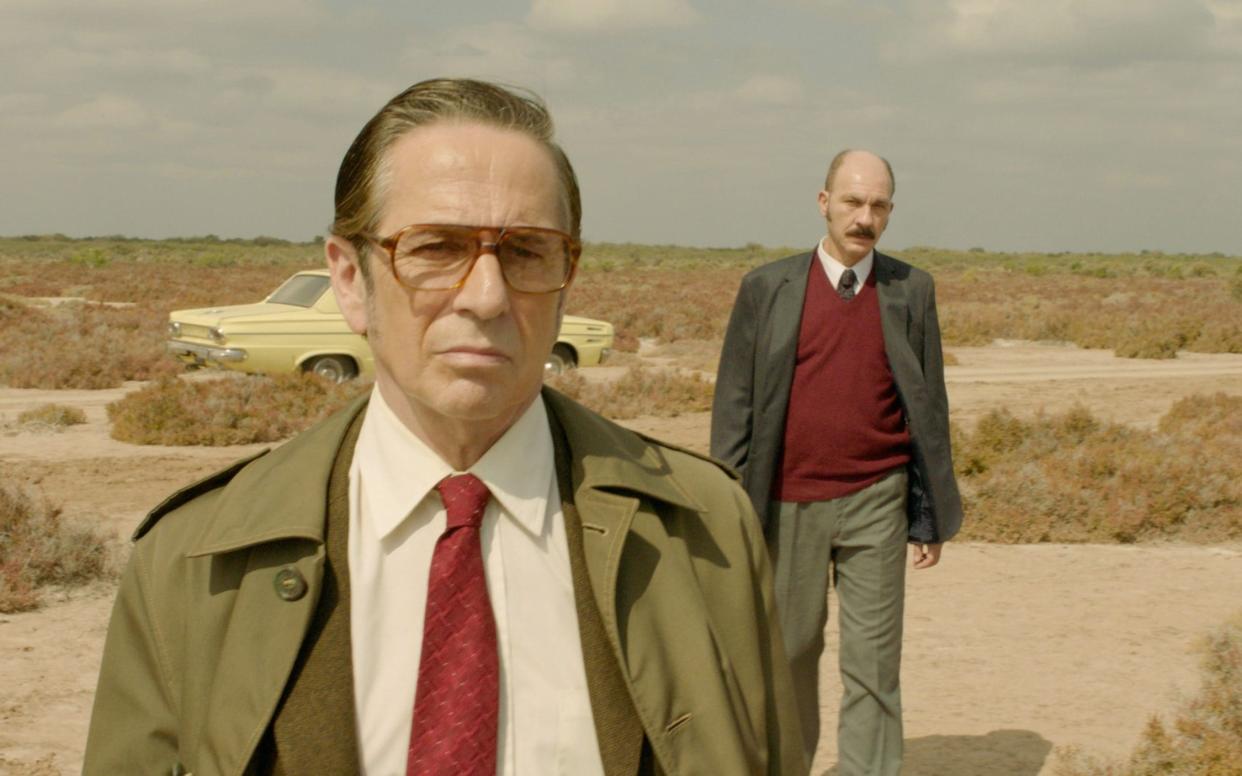Rojo, review: this eerie period think-piece captures the darkness of mid-Seventies Argentina

(15 cert, 109 min)
Dir: Benjamin Naishtat
Cast: Darío Grandinetti, Andrea Frigerio, Alfredo Castro, Diego Cremonesi, Laura Grandinetti, Susuana Pampin, Claudio Martinez Bel, Rudy Chenicoff, Mara Bestelli, Rafael Federman
Argentina saw a solar eclipse in November 1975, an event suggestively captured in the middle of Benjamin Naishtat’s eerie period think-piece, Rojo. Daytrippers to the beach don the usual cardboard eyewear – all, that is, but the main character, a squinting lawyer called Claudio – while the sky and landscape around them turn blood red. Moments later, the moon has passed over, and ball games carry on as if nothing just happened.
The country was soon to enter a state of more permanent darkness, when the military junta took charge a few months later, and proceeded to wipe out dissident elements by “disappearing” them forcibly into the region’s vast acreage of scrub. Rojo recreates the apparent calm before this oncoming storm – hiding a twitchy state of covert preparation, in which the outwardly respectable middle classes are complicit, wittingly or otherwise.
So the film’s opening shot, a static street view, shows an abandoned home being calmly denuded of its contents by opportunistic strangers. And then Naishtat, whose third feature this is, takes us to a busy restaurant one Saturday night, where Claudio, played by Wild Tales and Talk to Her’s Darío Grandinetti, is sat waiting for his tardy wife (Andrea Frigerio), and becomes involved in an excruciating altercation with another man (Diego Cremonesi).
This angry fellow, henceforth referred to as “the hippie”, claims he’s ready to order, and demands the seat Claudio already has. While vacating after a while, the latter bides his time, and then unleashes a lawyerly tirade, full of shaming language and articulate contempt, to the silent audience of everyone present.
It’s a brilliantly squirmy set-piece, blending Ruben-Östlund-level discomfort with a put-the-enemy-in-his-place monologue that’s more like a Tarantino slap-down. But Claudio is certainly not our white knight, and the point of Rojo is to show the bullying victory he presses home as the thin end of the wedge for his country’s moral defeat.
Business is not done between these two. A pre-dawn drive into the desert, with blood in a car’s back seat and windows smashed out, will spell the vanishing of one of them. (Strangers’ cars in this film invariably take you somewhere you don’t want to go.) Just like after that eclipse, life goes on, though, with game nights, dance rehearsals, and all the other bourgeois rituals the elite use to fill their time.
Even ordinary get-togethers are spiked with little clues, revealing treacherous power dynamics and the encroaching pitter-patter of state-wide corruption. A well-placed friend wants to turn over the empty house for a profit, while Claudio’s daughter (Laura Grandinetti) has a creepily possessive boyfriend (Rafael Federman) she’s keeping sexually at bay.
Rather than mouthpiece politics, Rojo goes for conscience-pricking metaphor, wheeling on a stage conjuror to make a woman disappear, while Claudio – recalling his near-namesake in Hamlet – leaps up guiltily at the association. It’s all about a society manoeuvring to stay at the dinner table while getting its unsavoury elements thrown out, and finding ways to stop them ever coming back.
The film’s one voice of critique or prophecy – other than Cremonesi’s furious malcontent, with his mad screaming of “Nazis!” – is its most sinister figure, a celebrity crime-solver first spotted behind Claudio’s shoulder, like a bloodhound closing in. This stand-in for Columbo, Detective Sinclair, is played as a pest in a raincoat by the always-great Alfredo Castro – Chile’s answer to Al Pacino. His job is to investigate a missing person, but instead of Columbo’s companionable bumbling, he has the complexion and charm of a corpse.
Escorting Claudio into the desert, where flies buzz greedily around unseen matter, he speaks of the “greater evil” impending, as if he’s crossed the Styx into Argentina’s coming hell and returned to deliver recon.
To Claudio, it’s all news: the superb Grandinetti, composed and cagey, suggests an entitlement that has rendered him perfectly oblivious to the slippery slope he’s on. He solves his problems by burying them in the wild, rather like Gabriel Byrne in Miller’s Crossing, and might be equally surprised to learn that he’s the Shakespearian villain of this piece. He dons a wig in the last scene that could only suit a dodgy politician, someone who’s got away with murder, or both – but the country is so wrapped up in pampering itself with lies, it doesn't even notice.

